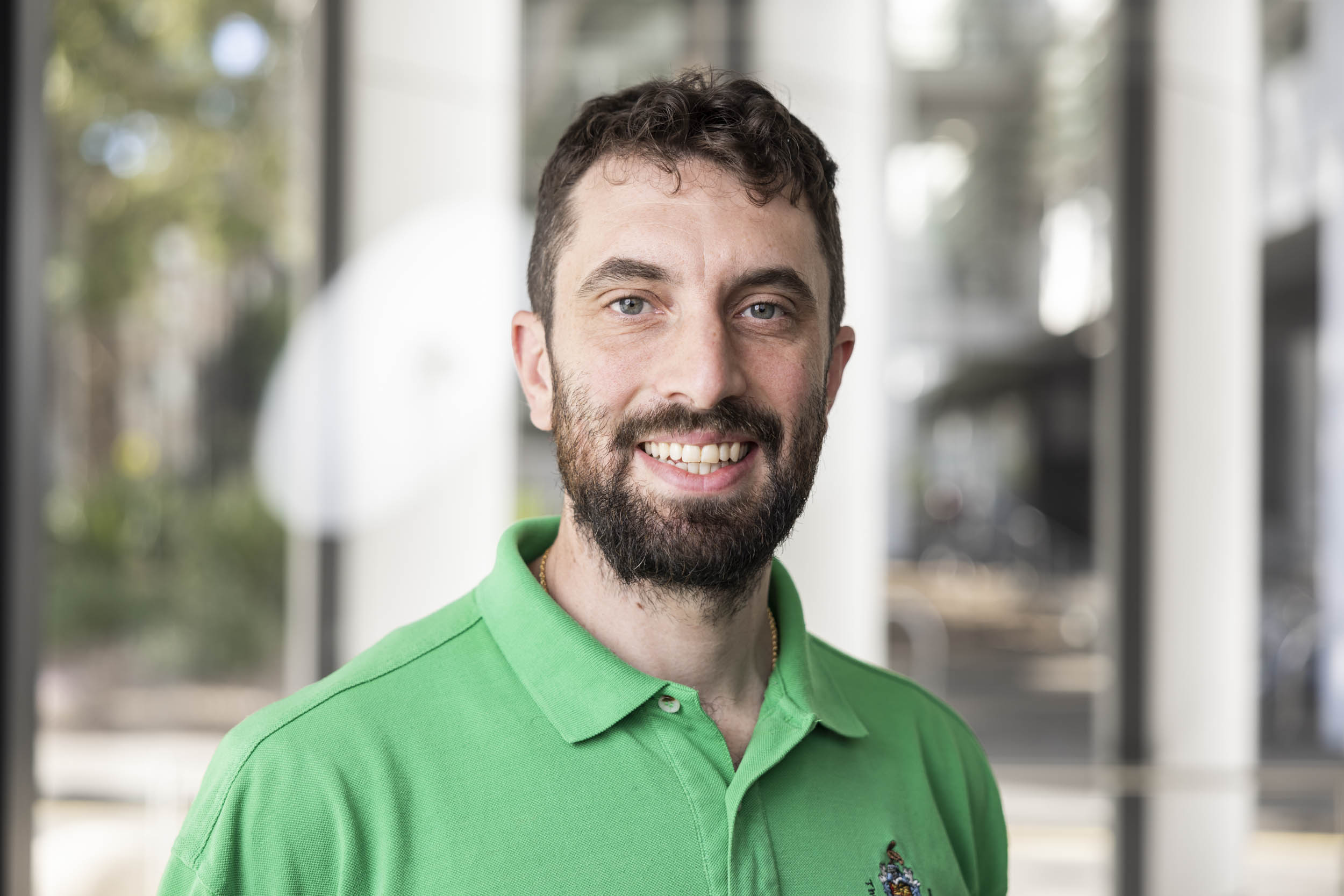
My Expertise
- Biophysics
- Bacterial Motility
- Bacterial Evolution
- Microscopy
- Single Molecule
- Medical Microbiology
- Antibiotic Microbial Resistance
Fields of Research (FoR)
Biophysics, Bacteriology, Biological Physics, Synthetic Biology, Biochemistry and Cell Biology, Statistical Mechanics, Physical Combinatorics and Mathematical Aspects of Condensed Matter, Structural Biology (incl. Macromolecular Modelling), Evolutionary BiologySEO tags
Biography
Dr Matt Baker is a Scientia Associate Professor in the School of Biotechnology and Biomolecular Sciences at the University of New South Wales.
Matt completed his DPhil in Physics at Oxford University as a John Monash Scholar studying the bacterial flagellar motor that makes nearly all bacteria swim. Subsequently Matt investigated protein transport in Oxford's Chemistry Research Laboratory and in the Department of Biochemistry. Upon his return...view more
Dr Matt Baker is a Scientia Associate Professor in the School of Biotechnology and Biomolecular Sciences at the University of New South Wales.
Matt completed his DPhil in Physics at Oxford University as a John Monash Scholar studying the bacterial flagellar motor that makes nearly all bacteria swim. Subsequently Matt investigated protein transport in Oxford's Chemistry Research Laboratory and in the Department of Biochemistry. Upon his return to Australia, Matt focused primarily on how simple subunit interactions govern assembly of complex architectures, including the rotor (NSMB 2016) and filament (eLife 2017) of the bacterial flagellar motor. The next question is how this complexity emerged. To begin addressing this, Matt's nascent group at UNSW looks at how ion selectivity changes using directed evolution (Mol Micro 2019, Front. Microbiol. 2020) to examine the evolutionary landscape that constrains the adaptation of the motor (Science Advances 2022). We then use this knowledge to examine potential applications of the flagellar motor elsewhere (Journal of Bacteriology 2021, Biomicrofluidics 2020).
Our group also investigates force sensitive proteins that in synthetic lipid bilayers (Channels 2019). These are essential at all scales of life, in bacteria to respond to osmotic shock and in mammals in the sense of touch and hearing and are involved in cancer progression and arthritis. In collaboration with Dr Shelley Wickham, we probe membrane dynamics and interactions using novel DNA nanotechnology (Nanoscale 2019, NAR 2021), with the ultimate goal to control membrane communication using de novo DNA nanotechnology.
Matt also has a love of radio: he was a Top 5 Under 40 Scientist in Residence at the ABC in 2015 and has continued since then as the regular science presenter on Nightlife, broadcast on ABC Local across Australia, and by producing content for the Health Report, Science Show, Saturday Extra and Earshot on ABC's Radio National. He is currently a 'Resident Scientist' on Koori FM - Sydney's First Nations Radio station and also on Radio New Zealand's flagship weekend breakfast show Saturday Morning with Kim Hill. He also has applied his data skills to journalism; he was Australia's inaugural Google Newslab Fellow in 2016 when he was embedded at the Sydney Morning Herald. Matt is active in Australia-China relations and has been an delegate and panel chair at the Australia-China Youth Dialogue since 2015.
Currently our group consists of 5 PhD students, 4 postdocs and 2 Hons students working in roughly a fifty-fifty split across flagellar and in vitro lipid/DNA projects. At any stage we welcome applications for PhDs and Hons students. We have recently been fortunate to be funded by the Human Frontier Science Program, so applicants interested in postdoctoral opportunities should get in touch.
A collection of links can be found on Matt's linktree.
Matt teaches in the School of Biotechnology and Biomolecular Science. He is co-convener of 3rd Year synthetic biology (BABS3200) focusing on DNA nanotechnology and directed evolution approaches, and he gives guest lectures into 1st Year Genes, 2nd Year Microbiology, 3rd Year Environmental Microbiology and 3rd Year Microbial Genetics.
My Grants
- International Funding:
- Human Frontiers Science Programme RGY0072.
- US Navy Office of Naval Research Program Grant
- Category 1 Funding:
- Australian Research Council DP190100497.
- Australian Research Council DP210101892.
- Industry Funding:
- CSIRO Synthetic Biology Platform Project Grant 2018-2021.
- Medical Advances Without Animals – 2020-2021.
My Qualifications
DPhil, Oxford University.
BSc (Hons), Australian National University.
My Awards
2023 Promoted to Associate Professor
2021-24 Elected Councillor, International Union of Pure and Applied Biophysics
2020-21 President, Australian Society of Biophysics.
2019 promoted to Senior Lecturer.
2018 UNSW Faculty of Science – Dean’s Award for Excellence in Science Communication
2018 Scientia Research Fellowship – UNSW Fellowship
2017 Young 'Tall Poppy' Award, NSW – Australian Instute of Policy and Science
2016 Google News Lab Fellowship – Sole Australian Fellow.
2015 Australia-China Youth Dialogue Delegate
2015 Top 5 Under 40 Winner – ABC/UNSW fellowship to ‘discover Australia’s new generation of science thinkers’
2015 Robert M. Macnab Memorial Travel Award to speak at BLAST XIII in Tucson, Arizona
2009: Nicholas Kurti Prize for Best 3rd Year DPhil Student Physics, University of Oxford.
2009: Nesta Famelab UK Finalist (http://www.famelab.org).
2005-2009 John Monash Scholar (http://www.monashawards.org). PhD Fellowship.
2001-2004 ANU National Undergraduate Scholarship.
My Research Activities
For more up to date biographies of my team and our current research projects please consult my lab website.
Some of our recent research has featured on the UNSW newsroom:
- How to program DNA robots to poke and prod cell membranes.
- Bacteria use ancient mechanisms to self-repair.
I also have written editorials (at the ABC and elsewhere) in the past on the role of the flagellar motor in understanding the evolution of complexity.
My Research Supervision
Areas of supervision
I am available to supervise excellent PhD candidates that can obtain UIPA or RTP scholarships to support themselves in the areas of biophysics, synthetic biology, microbiology, and bioinformatics.
Currently supervising
Vibhuti Nandel
Janelle Ramos
James Gaston
Jyoti Gurung
Md Imtiazul Islam